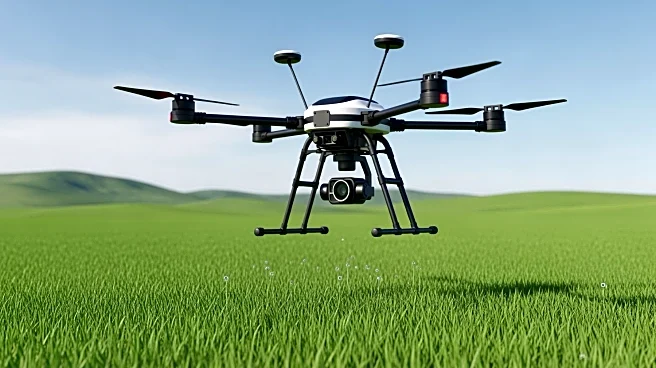What's Happening?
Farmers in the United States are increasingly turning to agricultural technology (ag tech) as a potential solution to navigate current economic challenges. The sector has seen significant advancements, including the use of autonomous tractors, drones
for seeding, and AI tools for yield prediction. These technologies promise to enhance efficiency and productivity, offering potential yield gains and cost savings. However, there is a sense of apprehension among farmers regarding the implementation costs and the return on investment. The history of ag tech is rooted in the 1980s farm crisis, which spurred innovation as a means to prevent similar economic hardships. The development of tools like yield monitors, GPS guidance, and farm management software has been pivotal in transforming agricultural practices.
Why It's Important?
The adoption of ag tech is crucial as farmers face mounting economic pressures, including fluctuating commodity prices and climate-related challenges. By leveraging technology, farmers can potentially increase their resilience and sustainability, ensuring long-term viability. The integration of these technologies could lead to more informed decision-making, optimizing resource use and reducing waste. This shift is not only vital for individual farmers but also for the broader agricultural industry, which plays a significant role in the U.S. economy. As farmers adapt to these innovations, they may gain a competitive edge, contributing to food security and economic stability.
What's Next?
As the agricultural sector continues to evolve, the focus will likely be on increasing the accessibility and affordability of ag tech solutions. Stakeholders, including policymakers and tech developers, may need to collaborate to address barriers to adoption, such as high initial costs and the need for technical training. Future developments could include more user-friendly interfaces and scalable solutions tailored to farms of varying sizes. Additionally, ongoing research and development will be essential to refine these technologies and demonstrate their tangible benefits to farmers.
Beyond the Headlines
The integration of ag tech raises important considerations regarding data privacy and the digital divide. As farms become more reliant on technology, ensuring the security of sensitive data will be paramount. Moreover, there is a risk that smaller farms may be left behind if they lack the resources to invest in these innovations. Addressing these issues will be critical to ensuring equitable access to the benefits of ag tech across the agricultural sector.
















